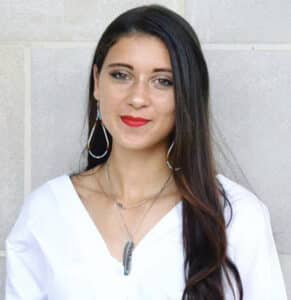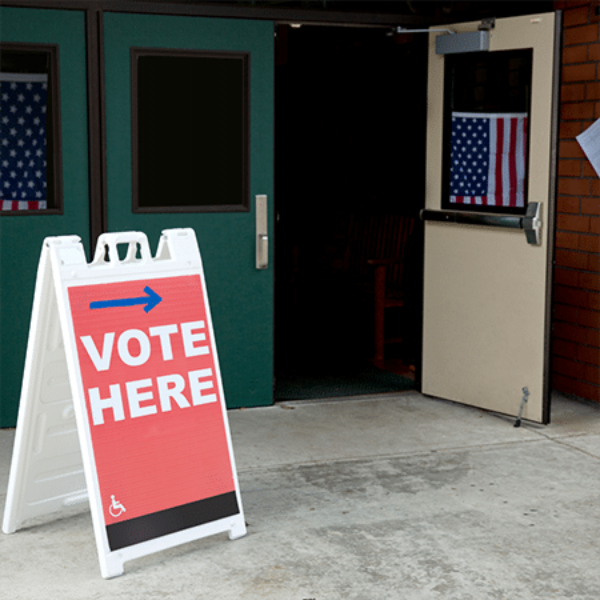
Q&A With 7 Directions of Service’s Aminah Ghaffar
Aminah Ghaffar, Policy Director of 7 Directions of Service, discusses their partnership with VoteRiders to remove voting barriers and amplify Native voices through voter ID education.

Aminah Ghaffar, Policy Director of 7 Directions of Service, discusses their partnership with VoteRiders to remove voting barriers and amplify Native voices through voter ID education.
Tell me about yourself and your role at 7 Directions of Service
My name is Aminah Ghaffar, I’m the Policy Director at 7 Directions of Service. 7 Directions of Service is an environmental organization run by Indigenous leaders. We’re located in North Carolina, but we do have an operation that expands to movements nationwide.
The organization was started as a way to organize against the Mountain Valley Pipeline Project, which was threatening to come through Alamance County, where our co-founders, Crystal and Jason, live. The movement expanded. We started working across the country with different environmental organizations to try to stop this pipeline and then from there, we also got involved with other movements.
My role is to be aware of different policies coming down the pipeline from various legislation that could disrupt environmental justice communities. I also do some lobbying at the state and federal level, assist with local community events, provide community education, and create social media posts that translate policy considerations in a way that’s more digestible for the public to understand.
What is your organization’s mission and core focus areas?
We’re focused heavily on Indigenous sovereignty and Indigenous stewardship of all these lands in the United States and beyond. Our focal point is advocating for the Rights of Nature. We have a bill that we’re trying to pass through the North Carolina legislature which is the Rights of Nature for the Haw River.
The idea behind the Rights of Nature is the fact that the river is alive, the earth is alive, and nature has rights.
We also focus on community education, making sure people are informed about the various projects coming through their communities. We help people discern the deception that corporations may have. Usually what corporations will do is disguise their projects as bringing jobs, but you also have to understand that there’s also pollution and other things that can be wrong with the practices of that particular company.
November is American Indian Heritage Month. Is there anything in particular 7 Directions of Service is doing to honor Indigenous communities this month?
Our big event this month — in addition to the typical organizing we do every month around the Mountain Valley Pipeline and other harmful fossil fuel projects — is Truthsgiving, which we’re hosting over the weekend. Truthsgiving is a community event where — anyone is invited, Natives and non-Natives — we dispel the misinformation and untruths about the history of Thanksgiving. Usually, we prefer to have a Wampanoag person or someone who is a descendant of that particular tragedy talk about people’s experience with settlers when they arrived here and tell people the truth about what happened on Thanksgiving. We also use the day to feed people traditional cultural foods. We provide this education from Indigenous perspectives year-round.
Now that the General Election is over, what is your organization’s vision for moving forward? What are some of your key initiatives for 2025?
The election was a difficult time for our organization. We’re continuing to do the same work that we do during every administration — tracking bills, monitoring who we’re going to be working with for the next four years, re-strategizing, and trying to figure out how we can still get things done in our communities.
It may not exactly look the same, but we’re trying to stay positive and trying to control what we can — which is continuing to do the work, and continuing to show up for each other and our communities.
We’re trying to stay focused on the important matters at hand, which is environmental justice. Although we may face some barriers from this upcoming administration, we’re still dedicated to doing whatever we can for environmental justice.
Local elections are year-round. Are there any key issues driving voters in your community to the polls in 2025?
At 7 Directions of Service, we provide education about how the political system works and make sure people understand that there are local elections that impact our lives on a day-to-day basis. People have the same concerns that they had during this past election cycle — economic security and making sure peoples’ rights are protected. I think the same issues are going to continue to rear their heads going into the next election cycle as well. People are also generally concerned about what’s going to happen with the courts, particularly with the way the Supreme Court has been making decisions. People want to know what other changes to anticipate and what to be proactive about to minimize the impact that a court decision may have — like encouraging our state legislature to codify certain laws.
At VoteRiders, we provide free voter ID resources tailored to specific communities, including Indigenous voters. Our resources cover all 50 states and DC, offering clear information on what forms of ID are acceptable for voting, including Tribal IDs — a vital need since only 16 states formally recognize Tribal ID as an accepted form of identification for voting. Because of this, and for many other reasons, Indigenous voters are often disproportionately impacted by confusing and very complicated voter ID laws. How is your organization working with VoteRiders to address ballot box barriers and make voting more accessible in your community?
All voting issues are centered around a lack of resources. For example, not having a mode of transportation to get to the polls — those are the types of economic barriers that prevent people from voting. We help make sure people know there’s an election going on, have a ride to the polls know what their voting rights are, know whether or not they can use their Tribal ID to vote, and know to stay in line even if the polls are closing.
We also collaborated with VoteRiders on a social media post to generate awareness around North Carolina’s voter ID law and give Native voters access to information about whether or not they can use their Tribal ID to vote.
This information makes a tremendous difference because a lot of people don’t know. And even if a Native person didn’t see that social media post, somebody who may know a Native person could have seen it and shared it with that Native person, making them aware that they can vote with their Tribal ID even if they don’t have a driver’s license or a North Carolina State ID.
We plan on getting more involved with get-out-to-vote efforts in the future and look forward to our continued partnership with VoteRiders.
Voter turnout was lower in the 2024 General Election compared to 2020. What would you say to those who don’t believe their vote can make a real difference?
Some people are experiencing really bad voter apathy because they’re told over and over again to go vote, but they’re not seeing their circumstances change. I would validate their emotions and encourage them to sit with those emotions. One thing we can do is help people with their basic needs.
Whether we have fundraisers or community events, we can help people feel nurtured, loved, and rejuvenated. Once peoples’ basic needs are met, then we can start having a conversation about participating in our political system, which feels so oppressive and like they’re ignoring people.
The goal is also to get people to the point where they feel comfortable sharing their personal experiences when they run for office one day if they do get in that driver’s seat and have the power to give people what they didn’t have at one point. If they’re able to speak to those same issues that they experienced when they were down, those personal stories can have a tremendous impact on people who are still having those same negative experiences.
We know millions of Americans need help with voter ID – but most organizations don’t have the resources to answer questions or provide personal assistance. VoteRiders wants to be your partner in filling that gap. Learn more about how we can work together at VoteRiders.org/partner.
November 22, 2024.
_____________________________________________________________________________________

Aminah is an integrative researcher, activist for Indigenous and Black issues, and advocate fighting violence against women and children. Aminah grew up in Pembroke, North Carolina and is a member of the Lumbee Tribe. Aminah has also channeled her energies into her education having studied Biology at East Carolina University where she ran track, and completed a Masters in Physiology and Biophysics with a concentration in Integrative Medicine from Georgetown University. She has served as a Domestic Violence and Sexual Assault victim advocate, a board member for the Missing and Murdered Indigenous Women NC Coalition, NC Stop Human Trafficking, and Lillian’s List. She has also written articles about various issues for Women’s Advance, and about disaster related issues for Southerly Magazine. In 2022, she received the ECU 40 under 40 award. She is currently serving as the Policy Director for 7 Directions of Service, an Indigenous led environmental advocacy group based out of NC. She is also a 2nd year law student at NCCU School of Law.

Voter ID rules and requirements can be confusing to navigate. VoteRiders is here to help! This post is part of our series addressing some of the most common questions and challenges related to voter ID laws. Unhoused citizens in all states have the right to register and vote. However, people who experience homelessness (or citizens who are […]
Read More